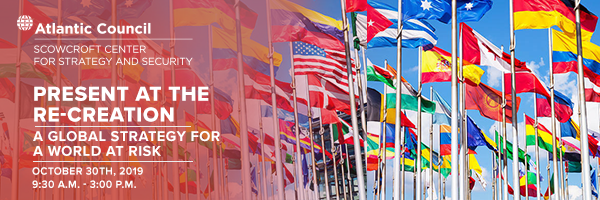
The authoritarian resurgence threatens to bring back the great power competition that caused so much destruction during the first half of the 20th century, argues Mathew J. Burrows, director of the Atlantic Council’s Foresight, Strategy, and Risks Initiative.
“The West still has an advantage in terms of values. Anti-corruption and rule of law are particularly popular, but the US and rest of the West must be careful about lecturing others too much,” he writes in Global Risks 2035 Update: Decline or New Renaissance.
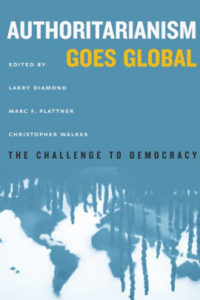 “Owing to increasing nationalism across the world, no leaders want to be told how to run their country’s government or economy,” Burrows writes. “For the moment, engendering growth and providing economic opportunities are more important for the emerging global middle class than establishing a full-bodied Jeffersonian democracy.”
“Owing to increasing nationalism across the world, no leaders want to be told how to run their country’s government or economy,” Burrows writes. “For the moment, engendering growth and providing economic opportunities are more important for the emerging global middle class than establishing a full-bodied Jeffersonian democracy.”
China’s Communist regime is “filling the vacuum” left by a retreating United States, said former US Secretary of State Madeleine Albright, “and where they aren’t filling the vacuum, the Russians are.”
To reverse this trend, an actionable strategy to revamp the international rules-based order – one based on the fundamental values of freedom and democracy – is needed, Atlantic Council Senior Fellow Ash Jain and Scowcroft Center Deputy Director Matthew Kroenig argue in another new Atlantic Council report: Present at the Re-Creation: A Global Strategy for Revitalizing, Adapting, and Defending a Rules-Based International System.
“Across the West, there is a loss of confidence in its own political model. Growing inequalities are leading many to question open-market economics and provoking a backlash against global engagement,” they contend:
The global distribution of power is shifting. Revisionist, autocratic states seek to disrupt or displace the existing system. Authoritarian state capitalism is challenging the Western model of free markets and politics as the best way to order society. In addition, new issues, such as emerging disruptive technologies, have arisen for which the original system was never designed.
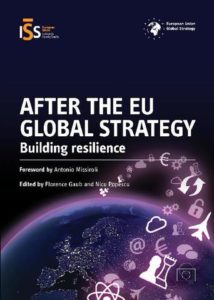 On the other hand, democratic actors continue to show resilience and resolve.
On the other hand, democratic actors continue to show resilience and resolve.
“Whether it is Latin America, whether it is in Africa, whether it is Europe, whether it is in Hong Kong, whether it is in the streets of Moscow, people are demanding accountability from their governments [and] demanding that their governments not be corrupt, that they be responsive to their needs,” said former US National Security Advisor Stephen J. Hadley.
“This is a perfect time,” he told this week’s forum, for the U.S. and its allies to promote a rules-based international order and “renew our vows to our democratic principles,” the Atlantic Council’s Jasper Gilardi reports.
A lesson from the experiences of Malaysia and Cambodia: Autocratic foreign meddling can backfire, notes Joshua Kurlantzick, a senior fellow for Southeast Asia at the Council on Foreign Relations. Hun Sen cruised to reelection in Cambodia. But in Malaysia, the public grew angry about the Chinese ambassador’s efforts to intervene in domestic politics, he writes for the Washington Monthly:
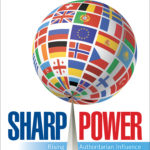 It is true that China and Russia are major threats. China’s challenges increasingly involve what researchers at the National Endowment for Democracy call “sharp power.” These are efforts to pierce, manipulate, undermine, and distract other countries, including by covertly influencing everything from their university campuses to their leaders. With these tools, authoritarian states can sow chaos within democratic political systems.
It is true that China and Russia are major threats. China’s challenges increasingly involve what researchers at the National Endowment for Democracy call “sharp power.” These are efforts to pierce, manipulate, undermine, and distract other countries, including by covertly influencing everything from their university campuses to their leaders. With these tools, authoritarian states can sow chaos within democratic political systems.
But the interference of China and Russia has generated a backlash. Instead of foreign meddling, the core of today’s authoritarian resurgence stems from something that’s largely internal: illiberal populists, he observes.
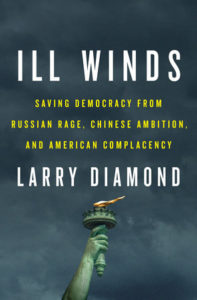 It’s unfortunate, then, that Stanford University’s Larry Diamond argues in his new book, Ill Winds: Saving Democracy From Russian Rage, Chinese Ambition, and American Complacency, that a pro-democracy, internationalist America is the key to stopping autocracy, Kurlantzick asserts:
It’s unfortunate, then, that Stanford University’s Larry Diamond argues in his new book, Ill Winds: Saving Democracy From Russian Rage, Chinese Ambition, and American Complacency, that a pro-democracy, internationalist America is the key to stopping autocracy, Kurlantzick asserts:
He’s right that the United States historically played an important role in promoting democracy, both during the Cold War and in the initial post–Cold War era. But while the U.S. ideally could play such a role again, Diamond downplays the limited ability Washington has to spread liberalization today. Even if the U.S. were not so divided, the public wants a more restrained approach to the world. Recent missteps, like the Iraq War and its link to the promotion of democracy in the region, have also clearly tarnished the American brand.
Still, Malaysia provides a hopeful reminder that the global democratic decline is not irreversible, he adds. But it also offers a sobering lesson: Malaysia was one of the only countries in the world to make democratic progress last year. RTWT







